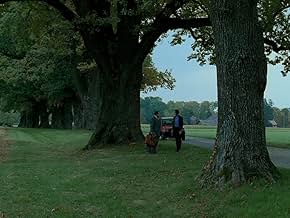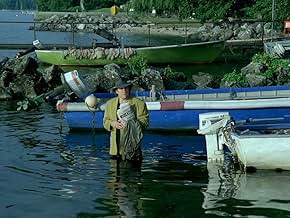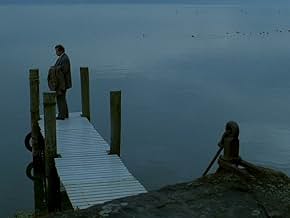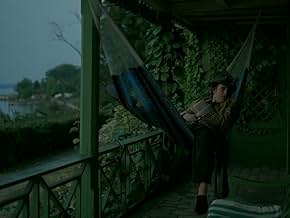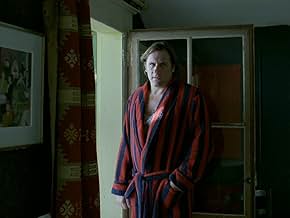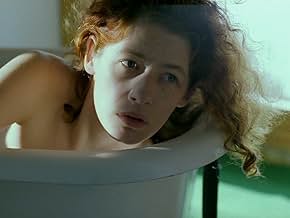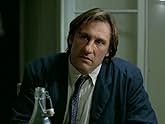CALIFICACIÓN DE IMDb
6.1/10
1.6 k
TU CALIFICACIÓN
Simon decide abandonar a su esposa Rachel.Simon decide abandonar a su esposa Rachel.Simon decide abandonar a su esposa Rachel.
- Dirección
- Guionista
- Elenco
- Premios
- 2 nominaciones en total
- Dirección
- Guionista
- Todo el elenco y el equipo
- Producción, taquilla y más en IMDbPro
Opiniones destacadas
Franco-Swiss filmmaker Jean-Luc Godard continues to be an enigma.It is not only the choice of the topics of his films but also the way he films them makes him a puzzling director.'Hélas,Pour Moi'/'Oh,woe is me' is one such film which brings forth the enigmatic as well as recondite nature of his film making techniques.In terms of conventional customs prevalent in the world of cinema,this film makes very little or no sense at all despite having taken the services of some good actors including French super star Gérard Depardieu.The entire film is imbued with a plethora of words which transport viewers to a world of poetry.However,this verbosity becomes an impediment to the film's narrative flow as there is an evident lack of story.It is not so long ago that this same director favored a beginning,a middle and an end in the same film.However, Oh,woe is me suffers enormously from the lack of these elements. This is a big price for a film to pay as despite beautiful locations including trains and ships,this very film has failed to communicate any message to viewers.This is something which every viewer would take with oneself when this film is watched.
A romance about Simon Donnadieu (Gerard Depardieu) and his decision to leave his ever-loving wife Rachel (Laurence Masliah).
This film is inspired by the Greek legend of Alcmene and Amphitryon and attempts to show the desire of a god to experience the truth of human desire, suffering and pleasure. The original scenario began with God riding a train through France and Switzerland, observing all the battles of humanity through the window. This sequence required expensive special effects and Godard finally gave up on the idea after visiting a company that demonstrated for him the effects they achieved for Jean-Pierre Jeunet's "Delicatessen".
What strikes me the most about this film is how Godard brought back that creepy voice from "Alphaville". Though there is no clear connection between the two films, I have to wonder why he chose to use that voice. Personally, I find it very unsettling and it jolts a viewer out of the film... which maybe the point.
This film is inspired by the Greek legend of Alcmene and Amphitryon and attempts to show the desire of a god to experience the truth of human desire, suffering and pleasure. The original scenario began with God riding a train through France and Switzerland, observing all the battles of humanity through the window. This sequence required expensive special effects and Godard finally gave up on the idea after visiting a company that demonstrated for him the effects they achieved for Jean-Pierre Jeunet's "Delicatessen".
What strikes me the most about this film is how Godard brought back that creepy voice from "Alphaville". Though there is no clear connection between the two films, I have to wonder why he chose to use that voice. Personally, I find it very unsettling and it jolts a viewer out of the film... which maybe the point.
Are you easily distracted? When I first watched Gaspar Noé's 2002 film, Irreversible, I sat near the screen and found the cacophony of images overpowering. On my second viewing, I sat further back, more easily contemplating the 'bigger picture,' appreciating a remarkable film. Virginia Woolf's 'Mrs Dalloway,' suggests a similar psychology in her 'stream-of-consciousness' where writing emulates experience: we need to step back before we can tell, what is the pertinent information? what is the story about? In real life, we may only see things in true proportion retrospectively.
This psychological hurdle forcefully confronts us in Hélas Pour Moi. I strongly urge you to see it twice if possible. The story is more logical and flowing when you know what is happening. You can appreciate the many subtleties, and the exquisite cinematography of Caroline Champetier. Failing that, I would recommend sitting at the rear of the auditorium.
We meet a publisher, Abraham Klimt. He has turned detective to investigate a strange story sent to him of divine intervention, though part of the manuscript is missing. We catch up with Klimt as he seeks out Simon and Rachel Donnadieu, our main characters, as well as the one witness who maybe saw the key event: did God take human form to have sex with Rachel, by inhabiting the body of Simon, her husband? We are subject to the same sort of events-discordance, people coming and going, conversations overlapping, as Klimt might, as he searches for truth in an unhelpful environment. This non-sequitur approach goes on for ages, and only in the last 30 minutes or so of footage does the story congeal for a first time viewer.
It re-works a play based on the legend of Zeus, Alcmene and her husband Amphitryon. In the Ancient Greek, the divine Zeus takes the human form of Amphitryon to mate with Amphitryon's betrothed. In the original, this leads to the birth of Heracles, born of divine father and human mother. But in Godard's modern setting, the story just goes as far as sexual union. God, once known as Zeus, now seems more Christian, and by implication can even lead us to question the veracity of the standard Mary-and-Joseph story. Klimt has no preconceptions: he just wants the truth.
There is no strong statement on whether one should believe in divine intervention, or just go for the more obvious explanation: that Simon, although estranged, is feeling horny, he suffers an obsession, and assumes a divine persona which the ever-devoted Rachel believes. "All men are the shadow of God to the women who love them." (We do however, see a low-budget and highly effective scene where God, looking rather scruffy and unkempt, enters Simon's body.) Godard called Hélas pour Moi "a complete flop." Yet, while difficult and obscure, it garnered critically praise and was his first feature to be distributed in the U.S. for ten years. Depardieu (who plays Simon) abandoned the film halfway through shooting, exasperated at Godard's methods. "It could have been a good movie," said Godard, "if Depardieu was willing to try. But he was not interested in the movie, in working to make it right. Of course, he said, 'Godard is a genius.' He was just making it for my name." But without Depardieu, the film would not have been financed.
Hélas pour Moi is replete with dozens of obscure references (from French and Italian literature, from philosophy, from theology) and quotations have sometimes been 'edited' by Godard. This makes it a particularly difficult film even if it wasn't so already. In the jangling, difficult-to-watch first two-thirds, apparently discordant ideas and images are set against the beautiful backdrop of nature and Lake Geneva. Such style is intrinsic to the content. "I feel a strange revulsion at the thought of crudely expressing what the spectator has probably guessed of his own accord," says Klimt, but it could have been from Godard's own lips.
For a while, I wonder if the film will develop into a polemic against religion – no stranger to Godard's virulence – perhaps replacing it with Art as the highest of aspirations. Yet, "there is always something depressing about the portrayal of crude reality," and belief is heralded in what could be interpreted as a positive light when a character asserts, "I believe because it is absurd." When logic fails, after all, we are left with belief. And what is truth? "Truth is what keeps the walls of houses upright, what keeps the roofs from collapsing." This is just one reading. We could view the film as an essay on human feelings. An enquiry into sexual union as an aspect of communicating with God (Rachel likens the gesture of hands in prayer to hands folded in an embrace around one's lover.) Or how an artist seeks meaning in the world. Or we can follow the poetry of Champetier's photography, enjoying the way subjects are framed in nature, focused and de-focused, and the beauty of the moment as a bicycle falls over, or a woman's hat blows off. As a feminist study, or as the way history (and literature) is created and redacted: the French words 'histoire (history) and 'histoires' (stories) being symbiotic for Godard - who entitled his history of cinema 'Histoire(s) du Cinéma.' Metaphysical aspects are drawn together in the opening, and in the final coda, halfway through the credits. These skilfully harmonise Godard's ideas on the nature of perception and the evanescent nature of truth.
"When my father's father's father had a difficult task to accomplish, he went to a certain place in the forest, lit a fire, and immersed himself in silent prayer. And what had to be done was done." The ritual was diluted over time. "But we do know how to tell the story." Never shy at innovation, Godard tells his story in a new, deep and meaningful way.
This psychological hurdle forcefully confronts us in Hélas Pour Moi. I strongly urge you to see it twice if possible. The story is more logical and flowing when you know what is happening. You can appreciate the many subtleties, and the exquisite cinematography of Caroline Champetier. Failing that, I would recommend sitting at the rear of the auditorium.
We meet a publisher, Abraham Klimt. He has turned detective to investigate a strange story sent to him of divine intervention, though part of the manuscript is missing. We catch up with Klimt as he seeks out Simon and Rachel Donnadieu, our main characters, as well as the one witness who maybe saw the key event: did God take human form to have sex with Rachel, by inhabiting the body of Simon, her husband? We are subject to the same sort of events-discordance, people coming and going, conversations overlapping, as Klimt might, as he searches for truth in an unhelpful environment. This non-sequitur approach goes on for ages, and only in the last 30 minutes or so of footage does the story congeal for a first time viewer.
It re-works a play based on the legend of Zeus, Alcmene and her husband Amphitryon. In the Ancient Greek, the divine Zeus takes the human form of Amphitryon to mate with Amphitryon's betrothed. In the original, this leads to the birth of Heracles, born of divine father and human mother. But in Godard's modern setting, the story just goes as far as sexual union. God, once known as Zeus, now seems more Christian, and by implication can even lead us to question the veracity of the standard Mary-and-Joseph story. Klimt has no preconceptions: he just wants the truth.
There is no strong statement on whether one should believe in divine intervention, or just go for the more obvious explanation: that Simon, although estranged, is feeling horny, he suffers an obsession, and assumes a divine persona which the ever-devoted Rachel believes. "All men are the shadow of God to the women who love them." (We do however, see a low-budget and highly effective scene where God, looking rather scruffy and unkempt, enters Simon's body.) Godard called Hélas pour Moi "a complete flop." Yet, while difficult and obscure, it garnered critically praise and was his first feature to be distributed in the U.S. for ten years. Depardieu (who plays Simon) abandoned the film halfway through shooting, exasperated at Godard's methods. "It could have been a good movie," said Godard, "if Depardieu was willing to try. But he was not interested in the movie, in working to make it right. Of course, he said, 'Godard is a genius.' He was just making it for my name." But without Depardieu, the film would not have been financed.
Hélas pour Moi is replete with dozens of obscure references (from French and Italian literature, from philosophy, from theology) and quotations have sometimes been 'edited' by Godard. This makes it a particularly difficult film even if it wasn't so already. In the jangling, difficult-to-watch first two-thirds, apparently discordant ideas and images are set against the beautiful backdrop of nature and Lake Geneva. Such style is intrinsic to the content. "I feel a strange revulsion at the thought of crudely expressing what the spectator has probably guessed of his own accord," says Klimt, but it could have been from Godard's own lips.
For a while, I wonder if the film will develop into a polemic against religion – no stranger to Godard's virulence – perhaps replacing it with Art as the highest of aspirations. Yet, "there is always something depressing about the portrayal of crude reality," and belief is heralded in what could be interpreted as a positive light when a character asserts, "I believe because it is absurd." When logic fails, after all, we are left with belief. And what is truth? "Truth is what keeps the walls of houses upright, what keeps the roofs from collapsing." This is just one reading. We could view the film as an essay on human feelings. An enquiry into sexual union as an aspect of communicating with God (Rachel likens the gesture of hands in prayer to hands folded in an embrace around one's lover.) Or how an artist seeks meaning in the world. Or we can follow the poetry of Champetier's photography, enjoying the way subjects are framed in nature, focused and de-focused, and the beauty of the moment as a bicycle falls over, or a woman's hat blows off. As a feminist study, or as the way history (and literature) is created and redacted: the French words 'histoire (history) and 'histoires' (stories) being symbiotic for Godard - who entitled his history of cinema 'Histoire(s) du Cinéma.' Metaphysical aspects are drawn together in the opening, and in the final coda, halfway through the credits. These skilfully harmonise Godard's ideas on the nature of perception and the evanescent nature of truth.
"When my father's father's father had a difficult task to accomplish, he went to a certain place in the forest, lit a fire, and immersed himself in silent prayer. And what had to be done was done." The ritual was diluted over time. "But we do know how to tell the story." Never shy at innovation, Godard tells his story in a new, deep and meaningful way.
By 1993, cinema had become a language unto itself; it was a language that was made up of not only words, but also sounds and images. As cinema history continues, the language has expanded time after time due to the talents and experiments of master filmmakers such as Jean-Luc Godard. All throughout his vast, decade spanning career, Godard has made film upon film, and with each decade of Godard that passes by, the more radical his style becomes. If ever there was a filmmaker that I could say took the cinematic language to Joycean heights, that filmmaker is, without question, Godard. With "Oh, Woe Is Me", Godard practically makes the cinematic equivalent of James Joyce's "Finnegans Wake" by crafting a masterpiece that works as a perplexing jigsaw puzzle, one injected with all kinds of clever jokes as well as sections of poetic beauty.
If one digs deep enough into my history of reviews, they will discover that often I use various terms over and over again to describe movies that I love, and one of the terms I have stumbled upon a seemingly ridiculous multitude of times is "poetic". I have labeled many of Godard's films as "cinematic poetry", and such a term may only mildly fit some of his finest work; however, few of Godard's films fit this phrase as well as this one. If one could translate the language of poetry to that of the cinematic language, the result would directly resemble many of Godard's later films, in particular "Oh, Woe Is Me". Certain sequences reached a height of starkly poetic emotion that I could hardly contain myself. I nearly cried as some of the most beautiful images and words were shown and spoken before my tearful eyes. For me, this was a damagingly powerful film watching experience, even when I had no damn clue what was even happening.
Along with exploring much poetic ground, "Oh, Woe Is Me" also covers deep philosophical questions about love and reunion and personality and death and life and mortality and so on. Godard throws around such essential themes like a careless baseball player, the main difference being that Godard is not careless (and I do not think he is highly athletic either, plus, isn't baseball mainly just an American thing? Do they have it in other countries? I don't travel a lot, so...), instead he is casual. He is able to toss so many fiercely important questions into an eighty minute long art film that it soon comes across as highly necessary for one to watch films such as this a few times. Not to mention, various sequences are made disorienting due to the overlapping dialogue, much of which happens with characters that are anonymous and off camera (much of the time these characters are absent from the setting the camera is mounted in, as well).
Although Godard seems to primarily function as a poet and philosopher in films such as these, he still does not entirely lose the essential label of the "entertainer". Without the factor of enjoyment being at least somewhat mixed into films such as these, there is little reason to watch them, and, luckily, Godard's films are some of the most entertaining of all time! Thankfully, despite the story's often heavy subject matter, in "Oh, Woe Is Me" Godard refuses to shy away from his unique sense of humor. Jokes are casually tossed in a familiar manner to the philosophical musings that are sprinkled throughout the densely layered masterpiece. Sight gags occasionally pop with jest, while witty dialogue and the occasional sly wordplay also merge with the film's tones of magic realism, melancholic romance, mythological fantasy, dark philosophical drama, avant garde cine-puzzle, and surrealist poetry. At one point in the film, an offscreen voice even references the film's bending of tragedy and comedy, and then the enigmatic voice goes on to state that they cannot even tell which is which anymore.
While Godard is certainly not the filmmaker flavor for everyone, mainly due to his strong and radical experimentation that often pushes the boundaries of the cinematic artform, his works must still be acknowledged as some of the most daring, provocative, strange, and unique in all of cinema's history and,despite its lack of fame and acclaim, "Oh, Woe Is Me" may very well be among his absolute finest efforts!
If one digs deep enough into my history of reviews, they will discover that often I use various terms over and over again to describe movies that I love, and one of the terms I have stumbled upon a seemingly ridiculous multitude of times is "poetic". I have labeled many of Godard's films as "cinematic poetry", and such a term may only mildly fit some of his finest work; however, few of Godard's films fit this phrase as well as this one. If one could translate the language of poetry to that of the cinematic language, the result would directly resemble many of Godard's later films, in particular "Oh, Woe Is Me". Certain sequences reached a height of starkly poetic emotion that I could hardly contain myself. I nearly cried as some of the most beautiful images and words were shown and spoken before my tearful eyes. For me, this was a damagingly powerful film watching experience, even when I had no damn clue what was even happening.
Along with exploring much poetic ground, "Oh, Woe Is Me" also covers deep philosophical questions about love and reunion and personality and death and life and mortality and so on. Godard throws around such essential themes like a careless baseball player, the main difference being that Godard is not careless (and I do not think he is highly athletic either, plus, isn't baseball mainly just an American thing? Do they have it in other countries? I don't travel a lot, so...), instead he is casual. He is able to toss so many fiercely important questions into an eighty minute long art film that it soon comes across as highly necessary for one to watch films such as this a few times. Not to mention, various sequences are made disorienting due to the overlapping dialogue, much of which happens with characters that are anonymous and off camera (much of the time these characters are absent from the setting the camera is mounted in, as well).
Although Godard seems to primarily function as a poet and philosopher in films such as these, he still does not entirely lose the essential label of the "entertainer". Without the factor of enjoyment being at least somewhat mixed into films such as these, there is little reason to watch them, and, luckily, Godard's films are some of the most entertaining of all time! Thankfully, despite the story's often heavy subject matter, in "Oh, Woe Is Me" Godard refuses to shy away from his unique sense of humor. Jokes are casually tossed in a familiar manner to the philosophical musings that are sprinkled throughout the densely layered masterpiece. Sight gags occasionally pop with jest, while witty dialogue and the occasional sly wordplay also merge with the film's tones of magic realism, melancholic romance, mythological fantasy, dark philosophical drama, avant garde cine-puzzle, and surrealist poetry. At one point in the film, an offscreen voice even references the film's bending of tragedy and comedy, and then the enigmatic voice goes on to state that they cannot even tell which is which anymore.
While Godard is certainly not the filmmaker flavor for everyone, mainly due to his strong and radical experimentation that often pushes the boundaries of the cinematic artform, his works must still be acknowledged as some of the most daring, provocative, strange, and unique in all of cinema's history and,despite its lack of fame and acclaim, "Oh, Woe Is Me" may very well be among his absolute finest efforts!
10claudiop
One of my all-time favourite films, IMHO one of Godard's most beautiful and reflective films. It is a contemporary existential allegory and elegeic in style. My recollection is that the pacing is languid and reflective. The emotional and spiritual crises are compelling and insightful, typical of Godard's obsessive observations of relationships. Depardieu and Masliah are wonderful. Uplifting experience. I saw it in San Francisco's Haight-Ashbury in 94.
¿Sabías que…?
- Citas
Mechanic: You should say: 'Mr' and 'Mrs." No first names. We're not characters in a novel.
Abraham Klimt: Maybe you are.
- ConexionesEdited into Histoire(s) du cinéma: Une vague nouvelle (1999)
Selecciones populares
Inicia sesión para calificar y agrega a la lista de videos para obtener recomendaciones personalizadas
- How long is Oh, Woe Is Me?Con tecnología de Alexa
Detalles
Contribuir a esta página
Sugiere una edición o agrega el contenido que falta

Principales brechas de datos
By what name was Peor para mí (1993) officially released in India in English?
Responda
